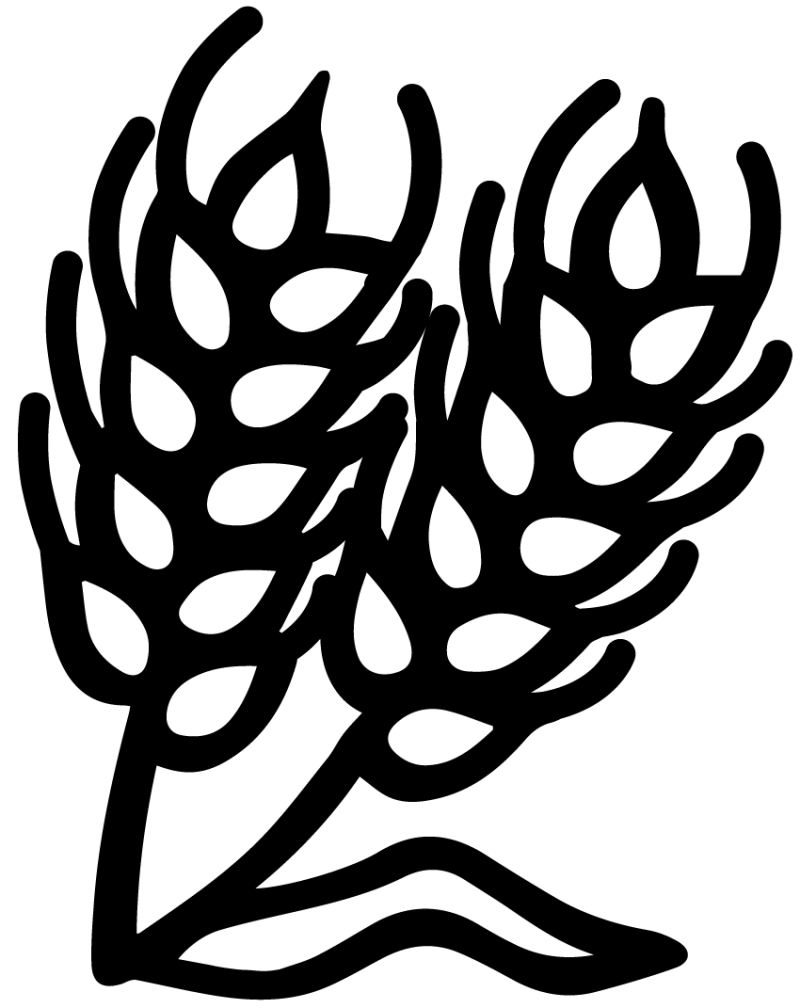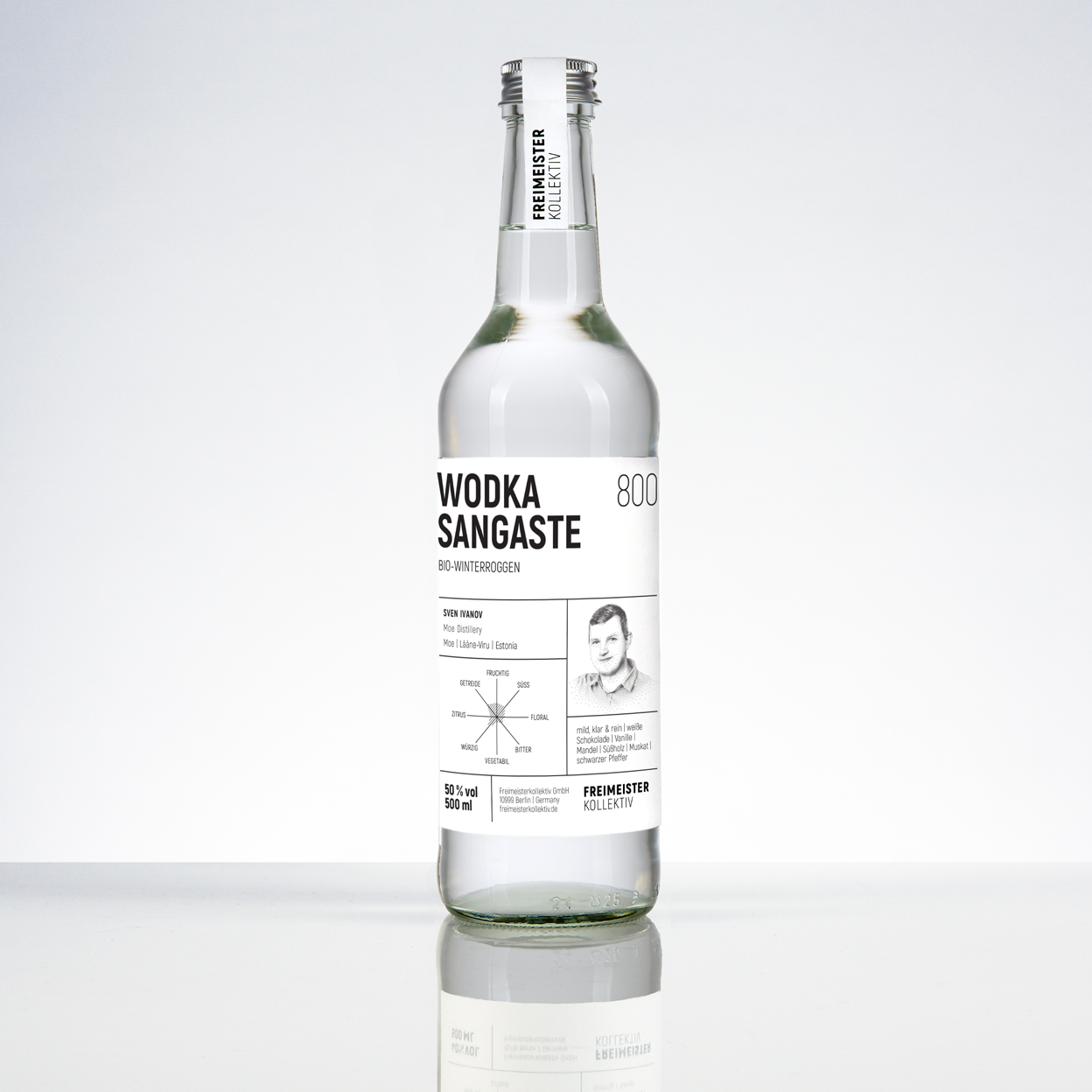Water Without Qualities
Hardly any other liquor represents so much soulless industrial production as vodka. At the same time, this spirit’s category has the greatest potential to reinvent itself. With WODKA SANGASTE 800 made from organic Sangaste winter rye, the Freimeisterkollektiv honors the liquor tradition of the so-called vodka belt. From the best, organic grown winter rye a mild vodka is distilled with character and identity.
Master distiller Sven Ivanov distils in one of the oldest vodka distilleries in the world with the utmost precision, so that subsequent filtration is not necessary. Subtle flavors reveal the delicate flavors of the ingredients. Clarity and purity are also achieved through precise separation of fusel oils, precise separation of heads and tails and extremely delayed rectification.
Vodka – A Projection Screen for Marketing
For the Freimeisterkollektiv vodka is cultural history and a reflection of the history of technology at the same time. Today vodka usually focuses on aspects of consumer culture: as an industrial spirit with no taste or identity, vodka is the inanimate projection surface for marketing and lifestyle. A sensory indistinguishable content is set in scene as conspicuously packaged. All its attributes are extrinsic and have little to do with the content of the vodka bottle.
In the nightlife scene the vodka bottle is the trophy for those celebrating their success in capitalist competition. Like a trophy, the lavishly decorated bottles in the international nightclubs are presented to the winners of our company. An amazing cultural change for a spirit that has been seen in the West for decades as a cheap consolation for the dreary, gray Soviet everyday life.
Cultural History vs. History of Technology
There is a legal prescription that defines this drink. However, this legal definition clearly shows the influence of lobbying associations and industry representatives. Compromises and spongy formulations in terms of aromatization and sugar or glycerine content appear to be intentional. Even the so-called “vodka war”, which raged for years within the EU, could contribute little to improving quality through a revised, legal product definition.
There are other contradictions and ambiguities when it comes to vodka. Some Eastern European countries try to outdo each other when it comes to who can look back on the oldest vodka history. Everyone claims to have distilled vodka at least from the late Middle Ages. However, it is always pointed out that vodka should be particularly neutral. “Vodka is a spirit drink made of ethyl alcohol of agricultural origin,” says the EU Regulation and thus demands by law the taste neutrality of this drink.
However, this neutral taste or the almost total absence of sensory properties is in contradiction to the long history of vodka. For to suppress the sensory properties of the raw material used as far as possible, a very high-percentage distillate must be produced. This in turn became possible only through the invention of the column distillery. Until the 19th century, all distilleries in Europe were equipped exclusively with stills, whose technical model was the Alambic – a distilling apparatus from the Arab cultural area, which was distributed in Europe from the late Middle Ages.
Thus, vodka can not be both at once: a distillate with a great tradition dating back to the Middle Ages, and neutral-tasting ethanol that was technically distilled only since the mid-19th century.
Estonian Drinking Strength
The anecdote is often told that the famous Russian chemist and father of the Periodic Table Dmitry Ivanovich Mendeleyev would have set the 40% volume of drinking water for vodka. As nice as the story sounds, the drinking strength of vodka was, however, already fixed in Russia at 40% Vol., when Mendeleyev was still a child.
In Estonia, however, vodka is traditionally served with 50% Vol. We are happy to follow this Estonian tradition with our WODKA SANGASTE 800, as the extremely mild character of this vodka allows it to be enjoyed at room temperature and at higher drinking strength.
Very clear | Minimal cereal notes
Mild and clear | Light fennel and licorice notes | Citrus | Vanilla
Nutmeg | Almond | Black pepper

100% organic Sangaste Winter Rye In the Estonian village of Sangaste, Count Friedrich Georg Magnus von Berg (1845-1938) bred the world's oldest winter rye still cultivated today. Over 40 crosses between different types of rye were produced by Graf Berg. Field tests with created lines were carried out over several years. As a result of uncontrolled cross-pollination, all populations appeared to be very diverse and heterogeneous. Count Berg decided on a different, albeit slower breeding method, the repeated selection of individual plants. The result of his extensive breeding was awarded at the World's Fair in Paris in 1889 and Chicago in 1893. For WODKA SANGASTE 800 Sangaste winter rye from organic farming is used, which is harvested in the region.

-

Liisa Luhaste
Distiller | Moe, Estonia
Liisa Luhaste has a degree in chemistry. Her research for her master’s thesis brought her to Rakvere Distillery, where she initially focused on the quality control of fermentation processes.
Her knowledge of fermentation and yeast and their control and management soon made her irreplaceable for the distillery. When Sven Ivanov took over this distillery next to the distillery in Moe, she became the manager and responsible for the operation. When Sven passed away unexpectedly in 2020, Liisa also took over the management of the distillery in Moe. As part of the restructuring, the entire alcohol production was moved to Moe, where Liisa designed and commissioned a completely new distillery.
Liisa continues Sven’s legacy with a focus on high-quality and primarily organic-certified distillates produced exclusively from local grains. Under her leadership, the sustainability of production has been further increased. Her scientific expertise has made it possible to further improve the outstanding quality of this traditional distillery and equip it with state-of-the-art distilling technology.

